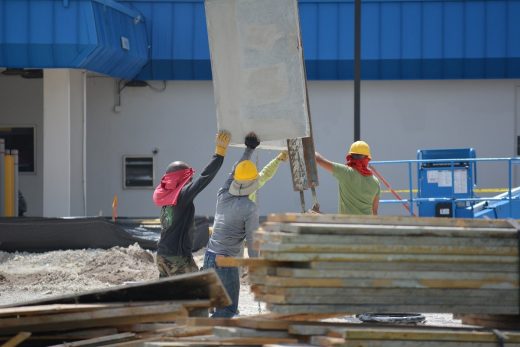Effective management in construction strategies guide, Building productive workforce, Timekeeping systems
4 Strategies for Effective Management in Construction
6 August 2024
Effective management in the construction industry is crucial for the success of any project. Construction managers face numerous daily challenges, from ensuring safety and compliance to managing time and costs.
Using the right strategies can significantly affect a project’s efficiency and outcome.
Here are four strategies for effective management in construction, backed by real examples and practical insights.
1. Advanced Timekeeping Solutions
Accurate timekeeping is essential in construction management to prevent time theft and ensure proper compensation for workers.
One effective solution is the use of advanced timekeeping systems. These kinds of systems provide reliable and efficient timekeeping, helping managers track personal hours accurately and prevent discrepancies.
For example, Skanska, a major construction and development company, implemented a digital timekeeping system to replace their traditional paper-based methods.
This transition not only reduced administrative burdens but also minimized errors and prevented time theft.
According to a McKinsey report, companies that adopt digital solutions can reduce project costs by up to 15% and completion times by 20%. This advanced system helped Skanska streamline operations and maintain better control over labor costs.
2. Safety and Compliance
Safety is paramount in construction. Ensuring that all safety protocols are followed protects workers and prevents costly accidents and delays.
Effective safety management involves:
- Regular training.
- Strict adherence to safety regulations.
- The use of technology to monitor compliance.
For instance, Guardian’s safety management technology provides real-time monitoring and reporting, ensuring compliance with safety regulations. Their tools help track employee certifications and skills, making sure that only qualified personnel are assigned to specific tasks.
This proactive approach has been shown to significantly reduce workplace accidents. According to OSHA, implementing a comprehensive safety and health program can reduce workplace injuries and illnesses.
In addition to using technology, fostering a culture of safety within the organization is essential.
This can be achieved with constant training and awareness programs. Workers should be encouraged to report unsafe conditions and participate in safety meetings.
A sound safety culture can lead to fewer accidents and a more productive workforce.
Communication and Collaboration
Successful communication and collaboration are the backbone of effective construction management. Ensuring all stakeholders are on the same page helps avoid misunderstandings and ensures everyone is working towards the same goal.
Platforms like Procore have revolutionized how construction teams communicate and collaborate. Procore’s cloud-based solutions allow for seamless document sharing, real-time communication, and effective task management. This has led to enhanced coordination among team members, resulting in fewer delays and higher project efficiency.
Regular meetings are crucial for maintaining effective communication. These meetings give an opportunity to discuss progress, address issues, and plan the next steps. Clear documentation is also essential. All project documentation should be clear and accessible to all team members. This ensures everyone has the information they need to perform their tasks effectively.
Feedback mechanisms are another critical aspect of effective communication. Implementing feedback mechanisms allows for continuous improvement of communication processes. Team members should be encouraged to provide feedback on what works well and could be improved.
3. Real-Time Data for Project Management
Real-time data is crucial for making well-thought-out decisions in construction management. Integrating project management tools that provide real-time updates on project progress, resource allocation, and potential issues can significantly improve project outcomes.
Turner Construction, for example, uses a comprehensive project management platform that integrates real-time data across all aspects of its projects. This system allows managers to monitor progress, identify bottlenecks, and make adjustments promptly.
As a result, Turner Construction has successfully completed a couple of large-scale projects on time and within budget, demonstrating the power of real-time data in effective project management.
Real-time data can also enhance resource allocation. By having a clear view of the resources available and their current usage, managers can make thoroughly thought decisions about where to allocate resources to maximize efficiency.
This can help stay away from delays and ensure that projects stay on schedule.
4. Enhancing Construction Management with Technology
The construction industry is increasingly adopting technology to enhance management practices. Technology plays a crucial role in modern construction management, encompassing everything from advanced timekeeping solutions and real-time data platforms to estimation and management tools. This includes specialized platforms for drywall bidding and flooring takeoff software, which streamlines various aspects of the construction process.
The use of technology not only improves efficiency but also enhances safety and compliance.
One example of how technology is used in construction management is using drones for site inspections.
Drones can provide high-quality images and videos of construction sites, allowing managers to monitor progress and identify potential issues. This can help control delays and ensure that projects are completed on time.
Building Information Modeling (BIM) is another technology revolutionizing construction management.
BIM helps with the creation of detailed 3D models of construction projects. These models can visualize the project, identify potential issues, and plan construction activities. This can help improve coordination and collaboration among team members.
5. Employee Engagement and Motivation
Engaged and motivated employees are crucial for effective construction management. Motivated employees are more productive, dedicated to their work, and willing to go the extra mile to ensure the project’s success.
There are several ways to enhance employee engagement and motivation in the construction industry. One way is to provide opportunities for career development. This can mean offering training and development programs, providing opportunities for promotion, and recognizing and rewarding employees for their achievements.
Another way to enhance employee engagement is to create a positive work environment. You can do this by fostering a culture of respect and inclusion, providing a safe and healthy work environment, and promoting work-life balance.
Training and Development
Investing in training and development is important for effective construction management. Continuous training ensures workers have the skills and knowledge to do their tasks safely and efficiently. This can improve productivity and decrease the risk of accidents.
Training programs should be customized to the particular needs of the construction industry. For example, training on advanced timekeeping solutions and real-time data platforms can help workers effectively understand how to use these tools. Safety training is also essential. Workers should be trained to identify and report unsafe conditions, use personal protective equipment, and follow safety protocols.
On top of the formal training programs, on-the-job training can also be practical. On-the-job training allows workers to learn new skills while performing their tasks, helping ensure they have the practical experience they need to perform their functions effectively.
Effective Management in Construction Strategies – Key Takeaways
Effective management in construction requires a multifaceted approach that includes advanced timekeeping solutions, prioritizing safety and compliance, optimizing project management with real-time data, fostering effective communication and collaboration, leveraging technology, investing in training and development, and enhancing employee engagement and motivation.
By implementing these strategies, construction managers can significantly improve project outcomes, enhance operational efficiency, and ensure the safety and satisfaction of their workforce.
Author bio
Name: Paul Miller
Paul Miller is a skilled content writer specializing in construction management topics at MobiClocks. With a keen eye for detail and a passion for the industry, Paul writes engaging and informative articles that cater to professionals and enthusiasts alike.
Comments on this guide to Effective Management in Construction Strategies article are welcome.
Construction and Project Management
Construction and Project Management Posts
10 Best Construction Management Software in 2020
Rise of AI in Construction Project Management
Construction business management software
Develop an Effective Project Management Plan
What Is Construction Project Management
Habitual Canards of Project Management
Construction Posts
Building a Pedestrian Bridge Construction
Make Your Construction Fleet Efficient
5 reasons to use steel in residential construction
Property Articles
Comments / photos for the Effective Management in Construction Strategies advice page welcome.








